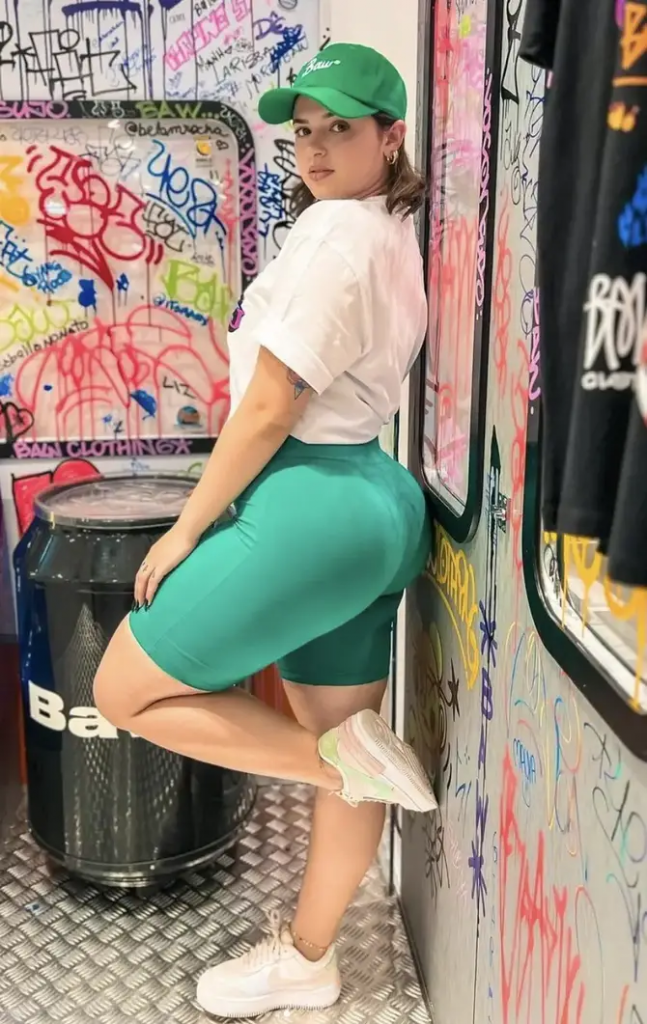In a world where personal expression and fashion often collide with societal norms, one woman’s story has sparked a heated online debate. Kerolay Chaves, a Brazilian social media personality, recently claimed she was kicked out of a supermarket because her shorts were deemed too revealing. Chaves, who took to Instagram to share her side of the story, argued that she was being bullied not for her choice of clothing but because she was ‘too hot’. Her bold statement has ignited conversations about censorship, sexism, and the fine line between freedom of expression and public decency.
While many sympathized with Chaves, praising her confidence and right to dress as she pleases, others took a more critical stance. Critics argue that there are social settings where revealing clothing might not be appropriate, particularly in family-friendly environments like supermarkets. The debate has evolved into a broader discussion on societal expectations, women’s rights, and whether her claim of being targeted for her attractiveness holds water.

A Bold Outfit Sparks Outrage
According to Chaves, her trip to the supermarket turned into a humiliating experience. She explained on social media, “I just got home from the supermarket and was harassed for wearing ‘too short clothes’. Some people looked at me with prejudice, others cursed me, and finally, I was expelled from the place.” Her words were accompanied by a photo of the outfit in question—extremely short denim shorts that resembled underwear, paired with a crop top that left little to the imagination.
Chaves was unapologetic about her fashion choice, arguing that the backlash was less about her clothing and more about societal discomfort with confident, attractive women. “I think it’s absurd for us women to still be treated that way just because we dress the way we want. The truth is that we go through this because we are too hot,” she declared, doubling down on her stance.

Her post quickly went viral, amassing thousands of comments from supporters and detractors alike. Many fans admired her confidence and agreed that women should have the freedom to dress as they please without facing harassment. However, the opposing voices were equally loud, with many suggesting that her outfit was inappropriate for a public place.
Public Backlash and Accusations of Attention-Seeking
While some rallied behind Chaves, asserting that she had every right to wear what made her feel good, others were not so convinced. Many criticized her outfit choice as unsuitable for a supermarket, suggesting that her clothing was more fitting for a beach or a private setting. “No need to go to a supermarket dressed like that. You are embarrassing the decent people who are often there with children,” wrote one commenter.
The backlash didn’t stop there. Some skeptics went so far as to question the authenticity of her story. One user noted, “Clearly it was for engagement and Instagram likes. She never went to the supermarket like this. Those who follow the stories know. I’m sorry, but this can’t help you.” This sentiment was echoed by others who pointed out potential inconsistencies in her account.
For instance, keen-eyed followers noticed a piece of clothing in her shopping cart, suggesting she might have covered up before staging the photos. “There’s a piece of clothing inside the cart… I don’t think she entered the market like that… maybe she has covered the bottom part and took it just to take those pictures… I guess she didn’t get kicked out of anything… even because it seems like there’s no one in the market,” speculated another commenter.

The Thin Line Between Confidence and Controversy
Chaves’ story has struck a nerve because it sits at the intersection of self-expression and public decency. On one hand, society has increasingly embraced body positivity and the idea that individuals should wear whatever makes them feel confident. On the other hand, there are still unwritten rules about appropriate attire in certain settings, particularly in spaces shared by diverse groups of people, including children.
While Chaves maintains that she was targeted because of her looks, critics argue that the issue is more about context than attractiveness. The argument is not new. Women have long faced scrutiny for their clothing choices, often being labeled as “seeking attention” or “inappropriate” when they choose to wear revealing outfits. However, the counterargument remains strong: policing what women wear is a form of control and a double standard that reinforces outdated gender norms.
Was It Really About Her Looks?
A significant aspect of the controversy is Chaves’ assertion that she was bullied for being ‘too hot’. The claim itself has sparked as much debate as her outfit. Many question whether attributing the incident to her physical attractiveness trivializes legitimate instances of harassment and prejudice. Critics argue that by framing the situation this way, Chaves might be undermining real discussions about body shaming and public harassment.
On the flip side, supporters argue that attractive women are often unfairly targeted, with their confidence and style choices being misinterpreted as arrogance or a cry for attention. For them, Chaves’ story is a reminder of how society can still be uncomfortable with women who own their sexuality and aren’t afraid to express it.

A Deliberate Move for Engagement?
Amidst the flood of opinions, a recurring theory suggests that the entire incident may have been orchestrated for social media engagement. With influencers and content creators often crafting narratives to increase visibility and interaction, some believe Chaves’ story fits this mold. Her Instagram account, filled with bold and provocative images, supports this theory for some observers who think this might have been a calculated move to boost her online presence.
“Stop using serious subjects for engagement fia. It’s not prejudice that you’re clueless,” commented a skeptic, suggesting that Chaves might be leveraging societal issues like sexism and body shaming for personal gain.